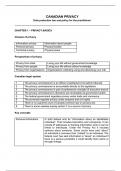Summary
Textbook Summary - Canadian Privacy, Data Protection Law and Policy for the Practitioner
- Book
- Canadian Privacy
This document comprehensively summarizes the textbook with concise and easy to follow charts and language. It will save the reader significant time when preparing for the CIPP/C examination, or any course where this textbook is required reading.
[Show more]




